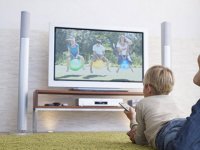Putting Kids on a “Screen-Time Diet”
Dr. Ari Brown is a pediatrician in Austin, Texas, and was the lead author of a recent American Academy of Pediatrics (AAP) study on the effects of media on children. She says that if we want kids to be emotionally intelligent, we have to put them on a screen-time diet.
Interviewed on NPR's New Tech City in November, Dr. Brown spoke about the findings of the study, which found that kids spending too much time in front of screens, even for interactive media, were more likely to suffer from obesity, aggression, and deficiencies in socialization. Her words are a wake up call to all of us looking to technology as a magic elixir for reaching children. Her data suggest that the screen-time diet should be administered after two hours of total screen time in any one day.
Dr. Brown uses the analogy of health -- too much of very good foods may not be a wise idea. Just as we have to instruct children in how to eat soundly -- and not overeat, we have to instruct them in the proper use -- and not overuse -- of media.
Among other findings of the study are that children who use digital media right before they go to sleep -- or try to go to sleep -- do not end up sleeping well. Her recommendation is to put all digital objects to sleep a half hour before children's bedtime.
Another finding is that children benefit from tactile experiences in ways that go far beyond simply improving hand-eye coordination. Playing with blocks, and, as children get older, having to manipulate other physical objects for more complex purposes, teaches a wide range of problem solving skills, skills that are at the heart of social and emotional learning. The AAP study is an important reminder that long before there was digital technology, there were people with terrific SEL skills. And children learned those skills through interactions with diverse others in their communities, very often in the context of "doing things."
For teachers, the lesson from Dr. Brown is that everyone in school must talk with one another about their instructional activities, to make sure that there is not too much reliance on digital media versus other forms of pedagogy and instruction. It's not just a matter of how much one class spends on screen time, it's the total time kids are spending on screens over the course of a school day.
It may not be easy, but making sure children do not get too much of a good thing is what all of the adults in children's lives are obligated to do (with the possible exception of grandparents, of course).
